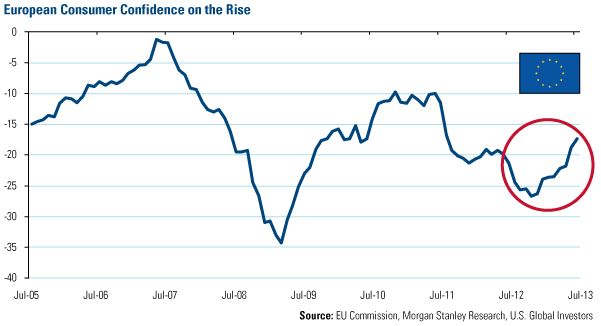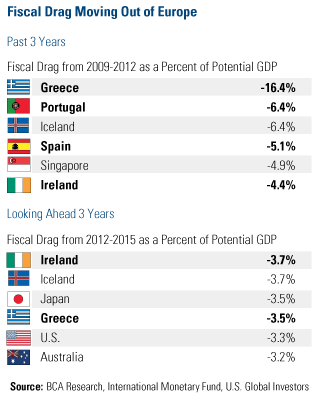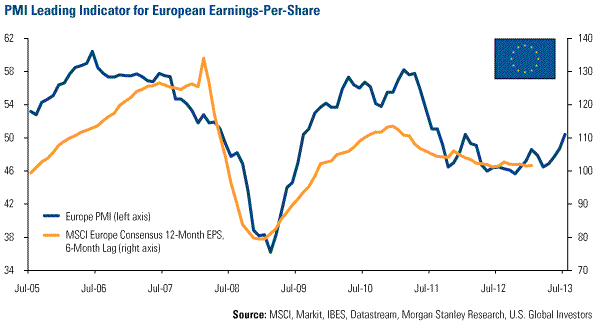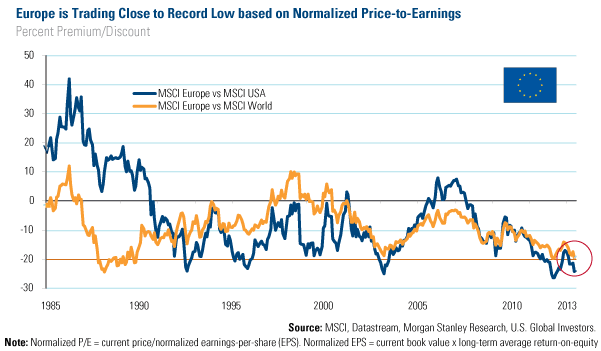A Surprising Way to Play a Europe Stock Market Rally
Stock-Markets / Stock Markets 2013 Aug 13, 2013 - 12:56 PM GMTBy: Frank_Holmes
 U.S. Global’s Portfolio Manager Tim Steinle is usually soft-spoken and mild mannered, so our ears perked up when he recently belted out “Europe is Rocking!”
U.S. Global’s Portfolio Manager Tim Steinle is usually soft-spoken and mild mannered, so our ears perked up when he recently belted out “Europe is Rocking!”
After a lengthy period of stagnant growth and lackluster results, the gradual crescendo of improving economic data that’s been coming out of Europe lately certainly commands attention.
As our resident expert of the European economy, Tim has been listing several economic indicators that were turning positive during the investment team’s morning meetings. While our entire team keeps track of the economic data and political policies of all the developed G-7 and emerging E-7 countries in the world, Tim keeps his finger on the pulse of European countries at all times in his hunt for outsized opportunities for the Emerging Europe Fund (EUROX).
I previously shared how economic releases have been beating expectations, as shown in the eurozone’s spiking Citigroup Economic Surprise Index. GDP is recovering too, with expectations that the year-over-year growth rate will significantly improve over the next year and a half.
Positive surprises and improving economic growth aren’t the only indications that the region’s economy is becoming healthier. Manufacturing appears to be on the mend. The latest reading of the purchasing manager’s index (PMI) was at a two-year high and topped the 50-mark. This indication of expansion hasn’t happened since July 2011. And, the PMI in Europe expanded at a faster pace than estimated.
Economic confidence in the region has also been rising. In July, it reached a 15-month high. Generally, when sentiment turns positive, businesses invest more and consumers spend more. We believe this improving confidence will potentially spur positive third-quarter economic growth and help the eurozone to exit its recession.

The area’s fiscal situation isn’t in dire straights as it has been. According to BCA Research, structural deficits peaked four years ago. As a result, during the 2009 to 2012 period, the biggest fiscal drags as a percent of potential GDP were concentrated in Europe, namely in Greece, Portugal, Spain and Ireland, four of the five members of the group formerly known as the PIIGS. Fiscal drag happens when a government’s net fiscal position doesn’t cover the desired net savings of the private economy.

Looking ahead at the 2012 to 2015 period, the largest fiscal drags are expected to be in other areas of the world. Based on data from the European Central Bank, “the government credit impulse is improving, which should help to lift the euro area economy out of its ‘endless recession,’” says BCA.
It’s no wonder Tim is cheering Europe on, as these economic data points have important implications for global investors.
Consider the area’s PMI, which Morgan Stanley Research found to be a six-month leading indicator of earnings-per-share (EPS). While the EPS for European stocks has remained relatively flat over recent months, it’s expected to follow PMI and move up.

Here’s another reason to look at the area: Europe has low valuations compared to the rest of the world. Take a look at the normalized price-to-earnings (P/E) ratio, which is trading at “close to a record valuation low,” according to Morgan Stanley Research. Compared to U.S. stocks and world equities, European stocks are trading at a significant discount.

So as countries including Germany, France and Italy recover, we have solid reasons to believe their eastern counterparts will enjoy a boost as well.
Take the CE3, which are the Czech Republic, Hungary and Poland. These countries are integral to the supply chain in Europe and dependent on domestic demand as well as its export growth.
We aren’t the only ones pounding the table for emerging European countries. Credit Suisse came out with a report recently with a bold headline, “Going Overweight Europe = Bullish CE3.” The report makes a case for the Czech Republic, Hungary and Poland as the countries have “cheap markets, cheap currencies, which are commodity importers and are not overheating,” says Credit Suisse.
The firm cites numerous positive data, including the CE3’s lead indicators moving together with Germany, an improving outlook for employment, recovering real retail sales, wage growth, and regional credit growth.
Stay tuned for Europe’s much-anticipated return to the limelight. But before Europe plays before a sold-out crowd, you might want to get your portfolio a front row seat.
Want to see more on commodities or emerging markets? Provide us with your email address and you’ll receive a note every time Frank Holmes updates his blog. You can also follow U.S. Global on Twitter or Facebook.
By Frank Holmes
CEO and Chief Investment Officer
U.S. Global Investors
U.S. Global Investors, Inc. is an investment management firm specializing in gold, natural resources, emerging markets and global infrastructure opportunities around the world. The company, headquartered in San Antonio, Texas, manages 13 no-load mutual funds in the U.S. Global Investors fund family, as well as funds for international clients.
All opinions expressed and data provided are subject to change without notice. Some of these opinions may not be appropriate to every investor.Standard deviation is a measure of the dispersion of a set of data from its mean. The more spread apart the data, the higher the deviation. Standard deviation is also known as historical volatility. All opinions expressed and data provided are subject to change without notice. Some of these opinions may not be appropriate to every investor. The S&P 500 Stock Index is a widely recognized capitalization-weighted index of 500 common stock prices in U.S. companies. The NYSE Arca Gold BUGS (Basket of Unhedged Gold Stocks) Index (HUI) is a modified equal dollar weighted index of companies involved in gold mining. The HUI Index was designed to provide significant exposure to near term movements in gold prices by including companies that do not hedge their gold production beyond 1.5 years. The MSCI Emerging Markets Index is a free float-adjusted market capitalization index that is designed to measure equity market performance in the global emerging markets. The U.S. Trade Weighted Dollar Index provides a general indication of the international value of the U.S. dollar.
Frank Holmes Archive |
© 2005-2022 http://www.MarketOracle.co.uk - The Market Oracle is a FREE Daily Financial Markets Analysis & Forecasting online publication.



